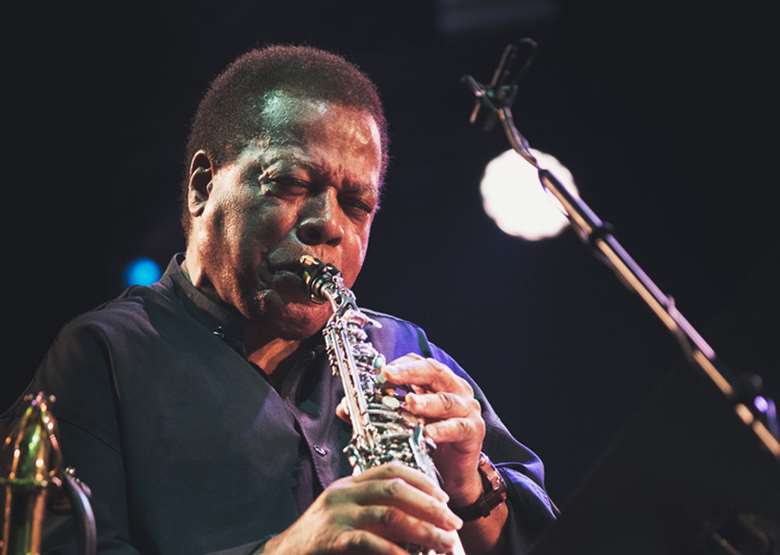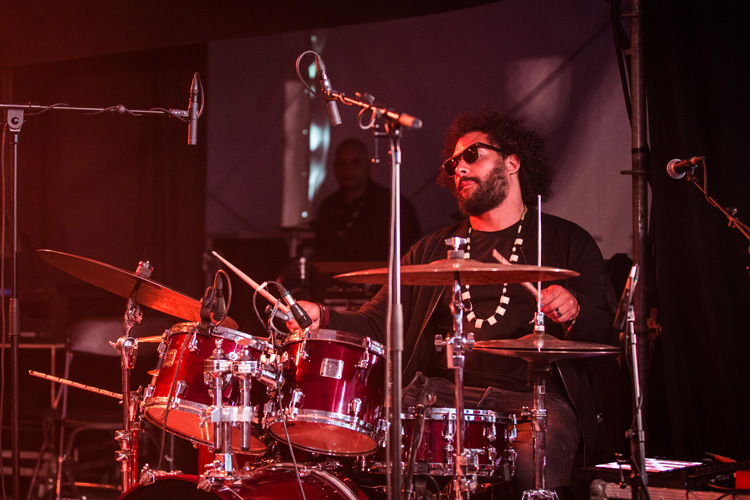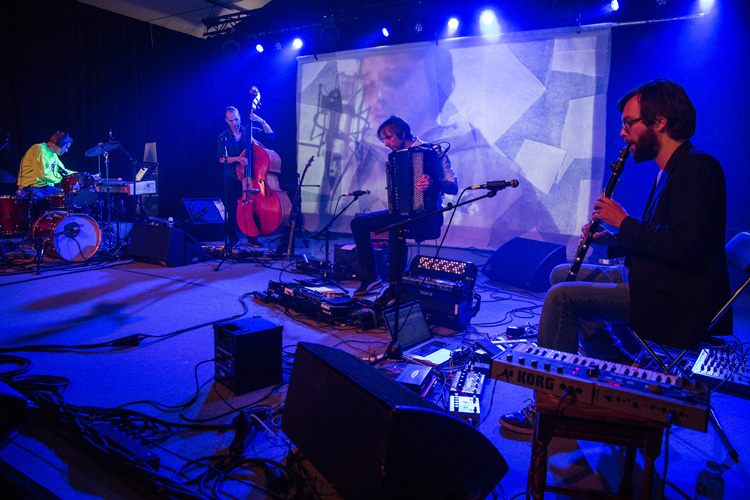Wayne Shorter Goes Large At Gent Jazz Jamboree
Thursday, August 3, 2017
As expected, the Gent Jazz Festival performs its characteristic trick of balancing hardcore jazz with outside forms, though this year the splitting of these types into two separate long weekends was less marked.

Instead, there were infiltrations: Grace Jones snuck into the first weekend, and the second stretch was fully populated by the Kamasi Washington/Robert Glasper/Shabaka Hutchings posse. This didn't seem to matter, as this fest's audience is noted for its open-mindedness (though the second weekend's Einstürzende Neubauten nite did bring out an avant-goth element, for one evening only).
The first weekend's major event was an appearance of the Wayne Shorter Quartet (above) with Belgium's own Casco Philharmonic, to perform the ambitious 'Emanon', which will make up the forthcoming album on Blue Note. They rehearsed in Gent, and also played a show at the North Sea jazzfest. Shorter is seated yet commanding, as he incrementally leads his quartet towards an intense state, over 25 minutes, which is when the Casco players begin to make their presence felt. Shorter has come up with a palette that's reminiscent of Aaron Copland: very American pastoral, and quite accessible. Following Casco's territorial establishment, the quartet enters stealthily, and suddenly they're out in the open. The brass section is aroused, the strings swipe with vigour, and Shorter begins to solo near the close of the first section, continuing with just his quartet. The re-entry of Casco tends to add a hint of swollen blandness, and it soon becomes apparent that the most stirring parts of the new piece feature the quartet in a prominent position.
Shorter is the absolute leader, among this throng of players, the parts that claw into the audience psyche being his soprano issuances, made with a darting hardness, as if he's so intent on his own expression that the orchestra almost becomes a sidelined entity, supporting his own sharp vision. This is how powerful this 83-year-old legend still remains. Shorter has made the score's mood a touch too cheerful for what is intended to be a science-fiction concept narrative, accompanied by comix art for the album's packaging. Perhaps this tale represents the optimistic side of SF? Nevertheless, Shorter is immune and uncompromising, right at the core of his new work.

Over on the smaller Garden Stage, it's often the preferred strategy to present a band playing a trio of sets, sliced and diced to fill the spaces between three of the main stage performances. Sometimes this can visibly freak out a crew, but some artists can take such a platform in their stride, throwing back to the old format for club jazz: multiple sets presented with their own micro-dynamic. The Chicago drummer Makaya McCraven (above) is one such dude. On the first night of the festival's second long weekend, he sharply drove upwards with each 40-minute segment, uniting a tough funk motion with an uncompromising freedom-edge. The music vibrates with the sense that it's being negotiated for the very first time, even if this isn't actually the case. McCraven wants improvisation to possess beats, however involved and complex these might be, topped with blistering trumpet strafes, sinewy basslines, rawk guitar solos and extreme-retro, post-Bernie Worrell cosmic keyboard textures. McCraven and crew are already steaming during the first set, and by the time we reach the third, matters are getting quite out of control..!
On the more local front, there were fewer Gentian groups making a significant mark this year, following 2016’s explosion of indigenous excellence.A pair of the best Belgian acts were Daau (a long-running Antwerpian collective) and Compro Oro, a much younger multi-directional posse from Gent, fronted by the vibes and marimba of Wim Segers. The latter fine-tuned their style as three sets unspooled, beginning with slinky exotica, then ranging into Ethiopian lands, but still rooted in the 1970s. Daau are celebrating their 25th anniversary, reconvened after a sometimes sporadic existence, following some departures of founding members. They too changed emphasis over a troika of sets, opening with a modern classical, accordion-dominated sound, then introducing increased electronic elements later in the evening, including samples of singers, storytellers and screamers, with their clarinettist increasingly doctoring his phrases via a laptop. Daau were an impressive part of the final night, which was certainly one of the festival's best.

The French-Belgian Trio Grande played three sets, with the evening's fourth expanding into the Reve D'Eléphant Orchestra, which features two of the threesome, Michel Massot (trombone/sousaphone) and Michel Debrulle (drums/percussion). The trio adopt a dislocated parading approach, their compositions on the short side, to facilitate the accommodation of their abundance of often romping motifs. Laurent Dehors has the benefit of a rack that includes jaw harp and various clarinets, including bass and contrabass. At one stage he stuffs two clarinets in his mouth at once. Grande's 'Bamako' number has contrabass clarinet, euphonium and a front-marching big bass drum, just to keep us confused, alert and bouncing! Massot hurls his euphonium in the air, then fortunately catches it again. The orchestra features a pair of vocalist-narrators, and has a much more modernised funky rock'n'rap sound compared to when they played here in 2011.
The French duo of Emile Parisien (soprano saxophone) and Vincent Peirani (accordion) illustrated how an intimate sound could exist on the main stage. Opening with some Sidney Bechet, Parisien soon revealed his trademark pixie footwork, which is an integral part of his delivery, helping to power his darting phrases, adding a general vigour to the performance. Even Peirani starts to softly dance as he plays, matching the fluidity of the duo's music. Between the two of them, we've never seen fingers flit so fleetly, the tunes packed with pauses, false endings, calm respites and sudden awakenings, as Peirani occasionally sings, adding to the potential for increased high velocity simultaneity.
In the headlining spaces, there were another pair of crucial sets: a rather lewd Grace Jones, searching for her mislaid dildo (an unusual onstage complaint), and the industrially extreme Einstürzende Neubauten, from Berlin, with frontman Blixa Bargeld as a completely compelling alternative cabaret singer (and castrato screamer!). Both of these acts are somewhat sideways from the usual Jazzwise territory, but illustrate the great imaginative breadth of the Gent fest's booking policy. To close, at midnight, the Fire! trio delivered a relatively brief set, treading the line between minimalist, ritual repeats and the enraged, ripping expression of Mats Gustafsson's tenor saxophone and electronics, returning to the jazz furnace.
– Martin Longley
– Photos by Bruno Bollaert and Geert Vandepoele